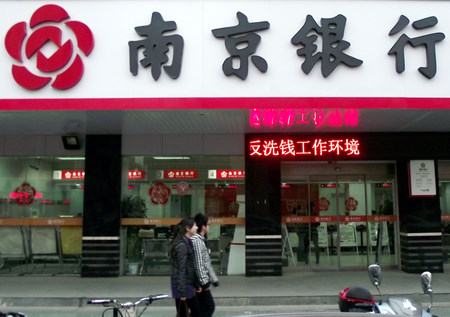Money
BNP Paribas China revenue doubles
By Wang Xiaotian (China Daily)
Updated: 2011-03-24 10:18
 |
Large Medium Small |
|
 |
|
A Bank of Nanjing outlet in Nanjing, Jiangsu province. BNP Paribas, which hasn't announced any plans to develop its retail business in China, holds a 12.6 percent stake in the lender, which forecast a net profi t of 1.54 billion yuan ($235 million) for 2010, a rise of about 50 percent from the previous year. [Photo / China Daily] |
BEIJING - BNP Paribas, one of the world's six leading banks and the eurozone's largest bank by deposits held, doubled its revenue in China in 2010, said a senior executive on Tuesday.
Clarence T'ao, chief executive officer of BNP Paribas (China) Ltd, told China Daily that the bank expects the growth rate to moderate this year. "The liquidity situation will have an impact on the overall banking environment this year," he said.
To soak up excessive liquidity and curb inflation, China has tightened monetary policies by raising the deposit reserve requirements for lenders nine times since the beginning of 2010 and raised interest rates in February for the third time since October. China's central bank also vowed to strengthen credit controls on banks through tools such as differentiated deposit reserve ratios.
Currently, commercial banking accounts for about 60 percent of BNP Paribas' total revenue in China, while other products such as interest-rate hedging and bond trading contribute 40 percent, according to T'ao.
The company hasn't announced any plans to develop its retail business in China.
BNP holds a 12.6 percent stake in the Bank of Nanjing, which forecast a net profit of 1.54 billion yuan ($235 million) for 2010, a rise of about 50 percent rise from the previous year.
T'ao expects revenue of BNP Paribas in China to increase by 200 to 300 percent in the next five years, as the transition of the country's economic growth pattern provides huge business opportunities.
T'ao said, "As domestic consumption rises, enterprises' investment and the opening up of the market will show steady improvement, and this will provide further growth prospects for the bank."
| ||||
The bank expects to increase client numbers in the metals, mining, oil and gas and transportation sectors and will support Chinese companies in overseas expansion and acquisitions.
It will also broaden loan syndication franchise, while retaining a dominant position in export finance.
In 1992, it opened a joint venture bank in Shanghai with Industrial and Commercial Bank of China, which turned into a wholly-owned enterprise bank in 2003. It withdrew its capital from a securities joint venture with Changjiang Securities in 2007.
However, the bank is open to any potential opportunities to develop the local securities business, said T'ao.
He said there is great potential to develop business in the securities sector, and with yuan-denominated IPO plans in Hong Kong by many companies, the bank is encouraged by the future opportunities this may provide.
BNP Paribas was ranked by Bloomberg and Forbes in October 2010 as the largest bank and largest company in the world by assets with more than $3.1 trillion.
It was formed through the merger of Banque Nationale de Paris (BNP) and Paribas in 2000. In April 2009, BNP Paribas purchased a 75 percent stake in Belgium's Fortis Bank. The purchase made BNP Paribas the largest bank by deposits held in the eurozone.
In 2010, the bank reported total global revenue of 43.9 billion euros ($62.5 billion), a 9.2 percent increase year-on-year, and net income of 7.8 billion euros, up by 34.5 percent.
| 分享按鈕 |



